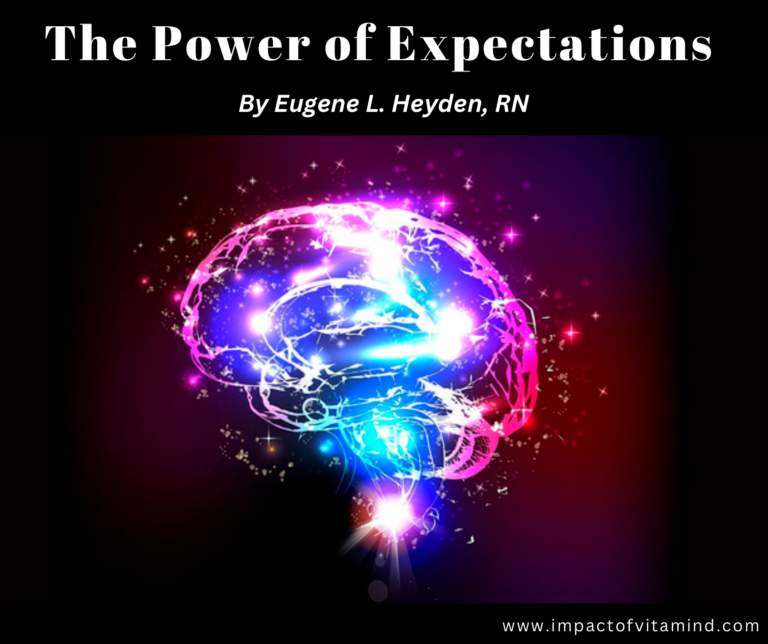The Power of Expectations

Last revision: 07-04-23
By Eugene L., Heyden, RN
“Rather than dismiss it, we should try to understand the placebo effect and harness it when we can.” ~Harvard Health Publishing, 2012
Much is said of the placebo response and its power to take something useless and turn it into something of value. People actually get well when they believe a procedure or a medication is the real deal, when it is not.
The story is told of a medic who, during World War II, ran out of morphine to treat his injured patients. Banking on the power of suggestion, the medic gave his patients saline instead of morphine. “Amazingly, 40 of the soldiers reported that the saline treatment eased their pain.” (BrainFacts.org, 2012)
In a rather dramatic study of the placebo effect, acupuncture was offered to irritable bowel disease (IBS) patients to see if a belief in the therapy would be effective in reducing symptoms. What’s more, the procedure involved “the use of needles that, unbeknownst to the patient, retract into their handles instead of penetrating the skin.” And surprisingly,
“44% of those treated with just the sham needles reported relief from their IBS problems. When sham needles reported relief from their IBS problems. When sham acupuncture was combined with attentive, empathetic interaction with the acupuncturist, the placebo effect got even larger, with 62% reporting relief from their IBS woes.” (Harvard Health Publishing, 2012)
Hard to deny the power of suggestion. It’s real, folks! Even drugs that are ineffective seem to be at least somewhat effective if the patient truly believes.
It is always tempting to dismiss a positive result from an alternative therapy, reported or experienced, to the placebo effect. But should we? Perhaps we should embrace the placebo effect and harness it to our benefit.
Written in the context of IBS, and in support of the value of the placebo effect, we read:
“Dr. Ted Kaptchuk, director of the Harvard placebo program, and colleagues have conducted “open-label” placebo studies, in which patients were told they were taking a placebo and that the placebo effect is powerful. In one small study of IBS patients, Dr. Kaptchuk and his colleagues found that an open-label placebo still produced a placebo effect and was about 20% more effective than no treatment. These and other results suggest that doctors could be more up-front with patients, informing them that a prescription is mainly for placebo purposes, and their patients would still benefit, as long as the prescription had no major drawbacks.” (Harvard Health Publishing, 2012)
Clearly there is power in suggestion. Your physician puts it to work, knowingly or unknowingly, day in and day out. Perhaps you should put it to work on your behalf. Here are a few suggestions:
- “Make sure you’re getting the support you need from your doctor. Placebo effect research has shown how important a supportive doctor-patient relationship can be. If you’re not getting the support and attention you need, consider switching doctors.
- “Recognize that it might be in your head” — but there’s nothing wrong with that. Behind the subjective experience of feeling better (and worse) are objective changers in brin chemistry that we’ve only started to understand.
- “Find treatments you can believe in… Expectations that an intervention will have some benefit increases the chances that it will.
- “…but keep your healthy skepticism. Quacks and charlatans can exploit the placebo effect to peddle treatments that are useless, and even harmful, if no other reason than they keep people away from getting treatment that is directly effective.” (Harvard Health Publishing, 2012)
Words to live by.
References
BrainFacts.org. The power of the placebo. 2012 The Power of the Placebo (brainfacts.org)
Harvard Health Publishing. Putting the placebo effect to work. Apr 1, 2012. Putting the placebo effect to work – Harvard Health
DISCLAIMER: This article is offered solely for informational purposes. The information contained therein and opinions expressed should be evaluated for accuracy and validity in the context of opposing data, new information, and the views and recommendations of a qualified health care professional, and not to be substituted for professional judgment and guidance or to provide a reason to neglect or delay appropriate medical care for self or for others. It is the reader and reader only who bears the responsibility for any actions that could be construed as being a response to the information presented. The statements and opinions expressed by the author have not been reviewed or approved by the FDA or by any other authoritative body, nor is the author endorsing any product or specific therapy mentioned. This article and the opinions contained therein are offered to the reader to broaden his or her understanding of the issues discussed and to help identify options that may be suitable for the individual to pursue, on behalf of self or others, under approval and direction of a qualified physician or medical team member. All questions of a medical nature which arise from reading this article should be directed at qualified health care professional. There are no guarantees that a suggested website and internal links are safe to visit or open or are currently available.
Copyright © 2023 Eugene L. Heyden, RN
All Rights Reserved
